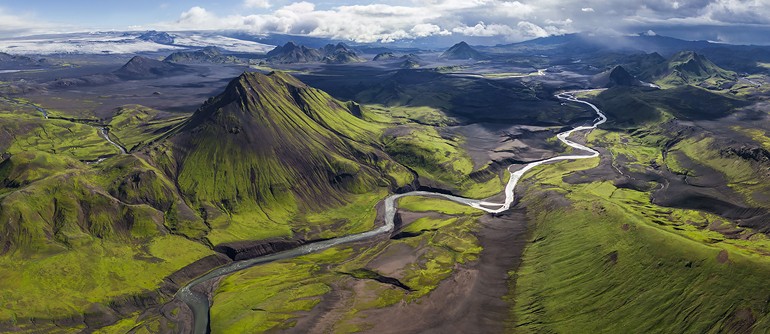The Cliff (Hamarinn, 2009) a Nordic TV production from Iceland, centres on what was deemed to be Eurochannel’s most ambitious TV crime drama. Quintessentially a thriller buried in secrets, it is directed by Reynir Lyngdal and in four-parts. What characterises it above others of its ilk is the chiller factor interlacing paranormal phenomena, a dubious construction plant and murders with its supernatural, intriguing plot developments and characters having powerful similarities with the fantastical, epic X Files from the 1990s.
The two main characters Inga (Dóra Jóhannsdóttir) and Helgi (Björn Hlynur Haraldsson) the more experienced detective from Reykjavik, develop a strong partnership while unravelling numerous transcendental incidents, suspicious deaths behind a contentious development project.
The first murder takes place on the cliff: a local excavator driver happens by the site when he notices unusual activity and decides to investigate ending in his untimely death that sparks off many of the townspeople’s superstitious beliefs in the phantasmal forces attached to the terrain, believed to be sacred and protected by forces from the beyond. These ‘hidden people’ form part of the regional mystique with which certain members of the tight community, an older woman and a young child, have a special bond through their second sight: they both predict in straightforward convincing miens, the series of deaths that take place in succession.
The structure is less formulaic than most murder mysteries: owing to the intense beauty of the scenes there are long panoramic takes to immerse the viewer in the countryside where music and dialogue are momentarily absent. However once the views are expanded on, the introduction of tones through dramatic contrasts begin with stark aural resonances that are electric, eerie and expand its intuitive omnipresence, creating a staggering impact: its confrontational force and aura, created by Ben Frost, sweeps into the despair of the inner markings of the Neolithic sculptures that adorn majestically the edges of the precipices.
Known for his experimental electronic music, the composer Ben Frost, originally from Australia, includes extreme musical influences from classical minimalism to punk rock and black metal. The layering that he imposes on his pieces, removes the audience from their comfort zone by executing acute, cutting-edge sounds that reach the highest pitch and the most excessive volume (as per the MUTEK international festival in Montreal where buildings literally shook owing to the intensively aggressive guitars). His work has accompanied numerous dance companies such as Chunky Move, the Icelandic Dance Company and choreographers Erna Omarsdottir and Wayne McGregor. Despite Frost’s style that emanates disinterestedness doubled up with remoteness, he collaborates extensively with renowned artists: Bjork, Amiina, Wildbirds and Peacedrums to name a few.
As the Icelandic language is insular although Indo-European (without being marked by other countries), it has not altered since the ninth and tenth centuries when Iceland was formed. Its closest linguistic relation is Norwegian but there are also elements akin to Hungarian which moreover behaves precisely like Icelandic regarding most neologisms*. The subtitles for the series were bravely assimilated as the language is bathed in antiquity: as a result Icelandic children are apparently able to read and understand texts from the eleventh century! Although contemporary vocabulary has been added, the language itself has not altered much since that epoch despite Rasmus Rask, the Danish linguist, having devised the modern standard in the 19th century.
There are other noteworthy Icelandic drama series that are well worth a long look such as ‘Pressa’ (The Press) now in its second series depicting a journalist who is a single mother juggling a chaotic lifestyle amidst her sleuthing scoops. Or for something lighthearted Icelandic style, try ‘Fangavaktin’ (The Prison Shift). Iceland seems to be the silent dragon amongst the Nordic TV ringleaders in high drama at the thriller table: in time its influence will be felt just as powerfully as all the other Scandi dramas proving the utterly misguided declaration, written in 1886, that: ‘Iceland lacks all conditions for dramatic literature’.
*neologisms: the creation of new words

Be the first to comment on "The Cliff: Otherworldliness in rural Iceland"